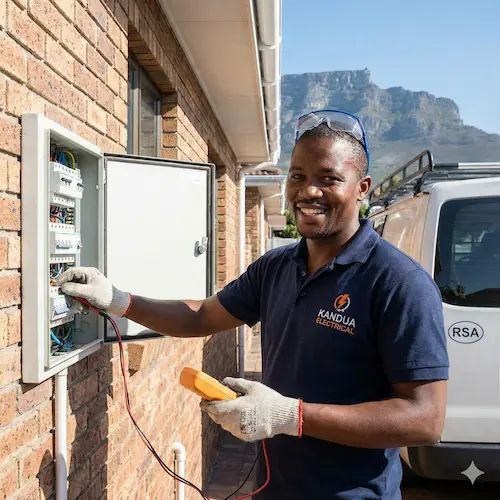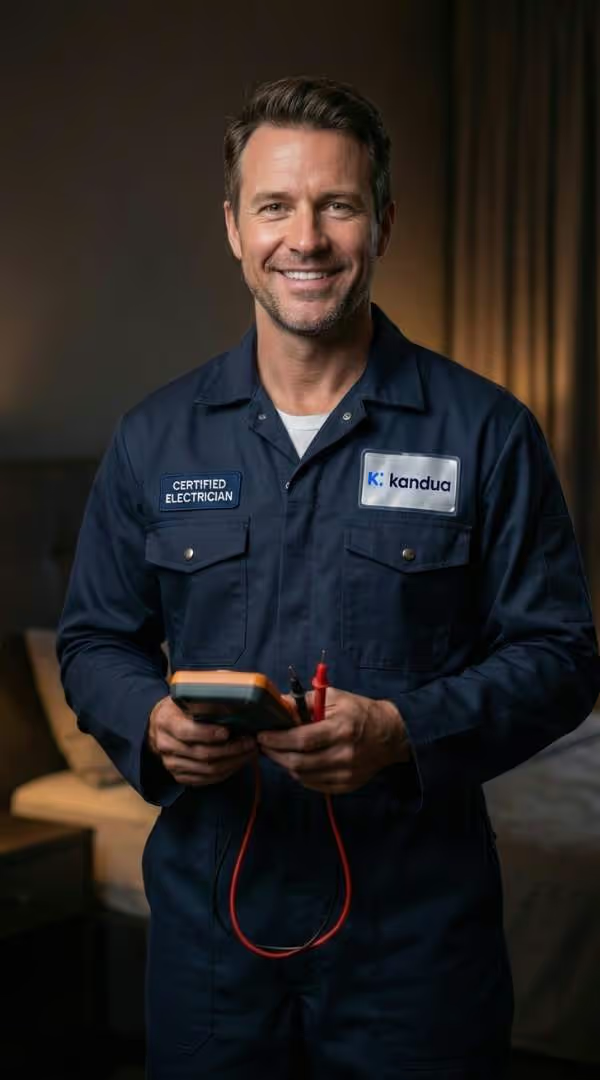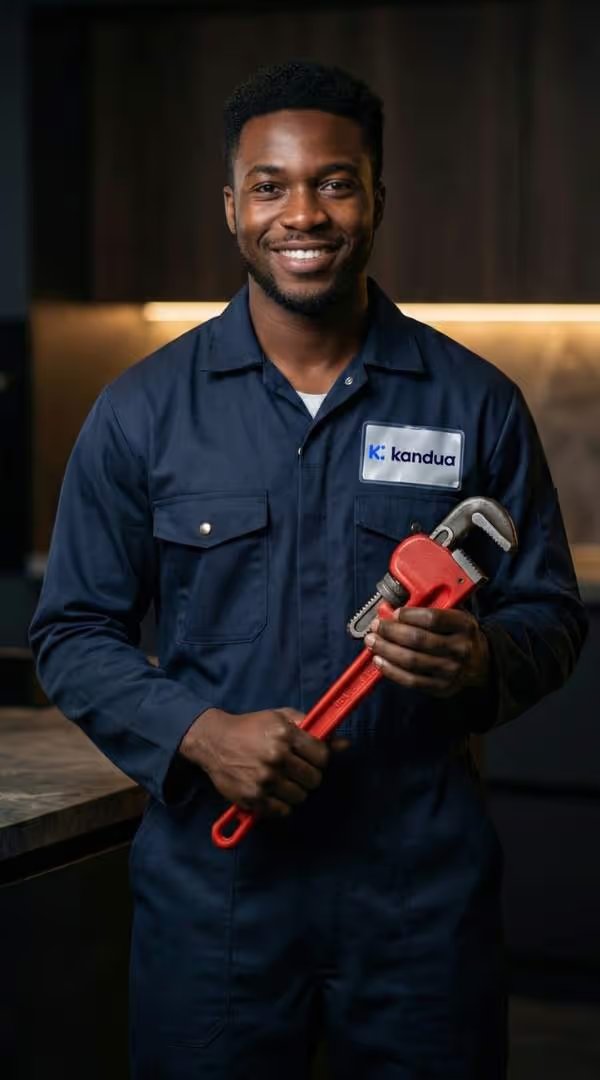Solar Backup Power Installation Cost in South Africa: Pricing Your Seamless Energy Independence
.webp)
Cost guide summary
A typical solar backup power installation in South Africa can range from R70,000 for a small, essential system to over R250,000 for a comprehensive, high-capacity setup.

A flat fee for coming to your location or onsite inspection to provide a quote, typically charged even if no work is done
An additional charge for urgent call-outs, typically outside of standard scheduling
Extra fee for work requested outside of normal business hours, including evenings, weekends, or public holidays
The typical cost of parts, supplies, or equipment used to complete the job, charged in addition to labour. Varies greatly based on job requirements
The average cost of labour per hour. Pros generally bill per hour for most jobs
A fee for site clean-up after the work is done, especially if the job creates debris, dust, or waste
A typical solar backup power installation in South Africa can range from R70,000 for a small, essential system to over R250,000 for a comprehensive, high-capacity setup.
Solar Backup Power Installation Cost in South Africa: Pricing Your Seamless Energy Independence
Investing in a solar backup power system is a smart move for any South African homeowner. It provides a reliable shield against load shedding and rising electricity costs, paving the way for greater energy independence. Understanding the costs involved is the first step towards making an informed decision. Prices for solar backup power installations vary significantly based on the system's size, the quality of components, and the complexity of the installation.
Solar Installation Advice
Before you commit to a solar backup power system, consider these essential tips to ensure your project is a sound investment that delivers long-term value:
- Assess Your Energy Needs: Before getting quotes, understand your household's daily electricity consumption (measured in kilowatt-hours, kWh). Check your utility bills or use an energy monitor. This helps determine the right size for your solar system, preventing you from overspending on unnecessary capacity or underspending on a system that can't meet your needs.
- Prioritise Quality Components: Your solar system is a long-term investment. Opt for high-quality, reputable brands for your solar panels, inverter, and batteries. While they may have a higher upfront cost, they offer better performance, longer warranties, and greater reliability, saving you money on replacements and repairs down the line.
- Verify Your Installer: Always use a qualified and certified solar installer. Check for credentials like a valid Wireman's License and registration with bodies such as the South African Photovoltaic Industry Association (SAPVIA). A professional installation ensures safety, compliance with national standards (SANS), and eligibility for any municipal rebates or grid-tying programmes.
Typical Costs for Common Solar Backup Power Features
Here are the average costs for the essential components of a solar backup power system in South Africa:
- Solar Panels: The cost is typically measured per watt. Expect to pay between R7 and R15 per watt. For a standard 5kW system, the panels alone could cost between R35,000 and R75,000.
- Inverter: A good quality hybrid inverter is crucial for managing power from the panels, battery, and grid. A 5kW hybrid inverter typically costs between R15,000 and R35,000.
- Battery Bank: This is often the most expensive component. Lithium-ion batteries are the standard choice. A 5kWh battery can range from R20,000 to R40,000, depending on the brand and technology.
- Mounting Structures: The framework that holds your panels in place on the roof costs between R1,500 and R5,000, depending on the roof type and system size.
- Cabling and Wiring: The cost for all necessary AC and DC cabling, trunking, and connectors can range from R3,000 to R8,000 for a standard residential installation.
- DC/AC Protection: This includes circuit breakers, fuses, and surge protection devices to keep your system safe. This typically costs between R2,500 and R6,000.
- Labour and Grid Connection: Professional installation labour, including issuing a Certificate of Compliance (CoC), generally ranges from R10,000 to R25,000. Municipal registration and grid connection fees can add an extra R1,500 to R5,000.
Regional Solar Installation Costs
Installation costs can fluctuate based on your location due to differences in labour rates, travel distances for installers, and local supplier pricing.
- Gauteng (Johannesburg & Pretoria): A standard 5kW hybrid system installation typically ranges from R85,000 to R160,000.
- Western Cape: Costs are often slightly higher due to high demand, with prices ranging from R90,000 to R170,000.
- KwaZulu-Natal: Expect to pay between R85,000 and R165,000 for a similar installation.
- Other Provinces: In more remote areas, costs might increase slightly due to travel and logistics, potentially adding 5% to 10% to the total price.
Factors Influencing Solar Backup Power Installation Costs
- System Size (kW): The higher the power output capacity of your system, the more panels you'll need, increasing the cost.
- Battery Capacity (kWh): Larger battery storage significantly increases the overall price but provides longer backup during outages.
- Component Quality: Premium, tier-1 brands for panels, inverters, and batteries cost more but offer better performance and warranties.
- Installation Complexity: Difficult roof access, complex wiring routes, and the need for trenching will increase labour costs.
- Grid Integration: The cost of registering the system with your municipality and ensuring it's compliant with their regulations can vary.
- Installer's Expertise: Experienced and highly-rated installers may charge more, but their quality of work and reliability are worth the investment.
Task Difficulty and Associated Costs
- Easy Jobs (e.g., small backup trolley system):
- Duration: A few hours
- Cost: R15,000−R30,000. This is typically a pre-built unit with minimal installation required.
- Complex Jobs (e.g., full 8kW+ hybrid system with multiple battery banks and grid-tying):
- Duration: 2–4 days
- Cost: R180,000−R300,000+. This involves extensive electrical work, multiple panel strings, and comprehensive programming.
Example Cost of a Typical Solar Backup Power Installation
This is an example of a popular mid-range system suitable for an average South African household.
- Task: Installation of a 5kW hybrid solar backup system with 5kWh battery storage.
- Materials: 8 x 550W solar panels, 1 x 5kW hybrid inverter, 1 x 5kWh lithium-ion battery, mounting kit, cabling, and protection. Approximately R75,000–R120,000.
- Labour: Professional installation, configuration, and issuing of Certificate of Compliance (CoC). Typically around R15,000–R25,000.
- Additional Fees: Municipal registration and engineering sign-off. Approximately R2,500–R7,000.
- Estimated Total: Approximately R92,500–R152,000.
When to Hire a Professional Solar Installer
Always hire a professional for a solar backup power installation. This is not a DIY project. You should hire a professional because:
- It involves working with high-voltage DC electricity, which is extremely dangerous.
- A valid Certificate of Compliance (CoC) issued by a qualified electrician is a legal requirement.
- Professional installers ensure the system is optimised for performance and longevity.
- Correct installation is required to validate component warranties.
- Your local municipality requires systems to be installed by a qualified professional for grid-connection approval.
Tips to Save Money on Solar Installations
- Get Multiple, Itemised Quotes: This allows you to compare prices for components and labour, ensuring you get a competitive rate.
- Start Small and Scale Up: If your budget is tight, consider a smaller hybrid system that allows you to add more panels or batteries later on.
- Understand Your Consumption: Don't oversize your system. A proper energy assessment ensures you only pay for the capacity you truly need.
- Look for Special Offers: Installers and suppliers sometimes run promotions on specific system packages or components.
Frequently Asked Questions About Solar Backup Power Installations in South Africa
How much does a basic solar backup system cost to run the essentials?
A small system designed to power essentials like lights, Wi-Fi, TV, and a few plugs during load shedding can start from around R40,000 to R70,000. This would typically include a smaller inverter, a few panels, and one battery.
Is financing available for solar installations?
Yes, most major South African banks offer financing options for solar installations, often through asset-backed loans or extensions on your home loan. Some installation companies also partner with finance providers.
How much can I save on my electricity bill?
A well-designed hybrid system can save you between 40% and 80% on your monthly electricity bill. The exact amount depends on your consumption patterns, system size, and the amount of sun your home receives.
What is the difference between a grid-tied and a hybrid system?
A grid-tied system generates power for immediate use and feeds excess back to the grid (if your municipality allows it), but it provides no backup during a power outage. A hybrid system includes batteries, allowing you to store excess energy for use during load shedding or at night.
How long do solar components last?
High-quality solar panels typically have a performance warranty of 25 years. Inverters usually last 5-10 years, and lithium-ion batteries have a lifespan of 10-15 years or a specific number of cycles.
Do I need municipal approval for my solar installation?
Yes, almost all municipalities in South Africa require you to register your solar system, especially if it is a hybrid (grid-tied) system. This is for safety and grid stability reasons. Your installer should manage this process for you.
How long does a typical installation take?
A standard residential installation (e.g., a 5kW system) usually takes 1 to 3 days to complete, from mounting the panels to commissioning the system.
What maintenance is required for a solar system?
Solar systems are relatively low maintenance. It's recommended to clean the panels once or twice a year to remove dust and debris. You should also have a professional check the system's connections and performance every 1-2 years.
Summary of Solar Backup Power Installation Costs (2025)
- Budget Cost (Low-End): Approximately R70,000
- Average Cost: Approximately R120,000
- High-End Cost: Approximately R250,000+
- Cost Range: R70,000–R250,000+
Brief Descriptions of Additional Solar Installation Costs
- Call-Out Fee: For an initial site assessment and consultation, an installer may charge a call-out fee of R500–R1,500, which is often deducted from the final cost if you proceed with the installation.
- Emergency Fee: This is not typically applicable for installations but for urgent repairs on an existing system, expect rates of R900–R1,800 per hour.
- After-Hours Rate: If you require installation work to be done outside of standard business hours, an additional rate of R300–R600 per hour may apply.
- Cleaning/Disposal Fee: This is usually included in the quotation and covers the removal of packaging and any construction debris, costing around R500–R1,500.
- Typical Materials Cost: For a standard 5kW hybrid system, materials (panels, inverter, battery, mounting, etc.) will range from R75,000–R120,000.
- Typical Labour Cost: The labour for a full installation and commissioning, including the Certificate of Compliance, typically costs between R15,000 and R25,000.
Related articles, advice and more
.webp)
How to Check If an Electrician Is Registered with ECB
The Electrical Conformance Board of South Africa (ECB) serves as a vital gatekeeper in this industry. If you are in the middle of a renovation or just need a new DB board installed, knowing how to verify your electrician’s registration is the most important step you can take.

What to Do If You Smell Burning from an Electrical Outlet
For South African homeowners, electrical faults are a leading cause of house fires. Whether it is caused by old wiring in heritage homes in suburbs like Melville or Observatory, or the strain placed on systems by post-load shedding surges, knowing exactly how to react can save your property and your life.This guide details the immediate steps you must take, the likely causes of the smell, and what to expect when you call in a professional.
.webp)
Your Inverter is Repaired! Key Checks to Ensure Continued Backup Power in SA
This guide will walk you through the essential checks and maintenance tips to maximise the lifespan and efficiency of your recently repaired inverter and battery setup, straight from the insights of experienced electricians across South Africa.
.webp)
How to Reduce Your Electricity Bill with Smart DIY Hacks
Affordable and straightforward DIY hacks can help you lower your electricity bill while reducing your dependence on the grid. Here are some practical strategies tailored to South African homes, along with estimated costs and potential savings.
.webp)
How to Install a Solar Panel Kit on a Budget in South Africa
With load shedding and rising electricity costs, taking control of your energy future is a smart move. This guide will walk you through the process, focusing on affordability and transparency, so you can build a system that works for your home and your wallet.
.webp)
TV Repair Costs in South Africa: Diagnosing Screen, Power & Component Issues
Find out what TV repairs really cost in South Africa – from call-out and diagnosis fees to screen, power and main board fixes – and when it’s cheaper to replace your TV instead of repairing it.
.webp)
LPG Gas Appliance Repair Costs in South Africa: What to Expect for Stoves, Ovens & Heaters
Repairing your LPG gas appliances requires certified expertise to ensure safety and functionality, with costs varying based on the specific issue and appliance type.
.webp)
Electrical Fixture Repair Cost in South Africa: From Flickering Lights to Faulty Switches
An electrical fixture repair in South Africa can cost anywhere from R450 for a simple fix to over R2,500 for complex diagnostics and repairs. The final price depends on the specific issue, the type of fixture, and the electrician's rates.
How to Install a Horizontal Geyser | Step-by-Step Pro Guide
Want to install a geyser like a pro? This step-by-step tutorial shows you exactly how to do a horizontal Ariston Axios geyser installation, straight from the BluLever plumbing workshop. 🎥 Hosted by MK, BluLever’s technical facilitator, and supported by a qualified electrician, Life and a BluLever graduate artisan, Zinhle. This is your ultimate guide to a SANS 10254-compliant installation — from preparing the wall, to plumbing, electrical wiring, and pro troubleshooting tips.
How to Maintain a Geyser | Step-by-Step Pro Guide
Want to maintain a geyser like a pro? This step-by-step tutorial shows you exactly how to do the three core geyser maintenance checks on an Ariston Axios geyser installation, straight from the BluLever plumbing workshop. 🎥 Hosted by MK, BluLever’s technical facilitator, and supported by a qualified electrician, Life. This is your ultimate guide to geyser maintenance — from diagnosing the problem to checking the heat regulation of the geyser, to pressure regulation and then finally corrosion protection.
Latest articles, advice and more
.webp)
How to Check If an Electrician Is Registered with ECB
The Electrical Conformance Board of South Africa (ECB) serves as a vital gatekeeper in this industry. If you are in the middle of a renovation or just need a new DB board installed, knowing how to verify your electrician’s registration is the most important step you can take.
.webp)
What Does a Plumbing Call-Out Fee Usually Include?
When that familiar drip-drip-drip starts under the kitchen sink or your geyser begins a slow weep in the ceiling, the first thing most South African homeowners do is pick up the phone. But before a wrench even touches a pipe, you’ll likely hear the term "call-out fee."
.jpg)
How to Choose Between Repair and Replacement for Your Geyser
Deciding between repairing and replacing isn't just about the immediate price tag. It is about safety, long-term electricity savings, and compliance with South African building regulations. Based on insights from vetted plumbers across Johannesburg, Cape Town, and Durban, this guide will help you navigate that decision with confidence.
.webp)
Beyond the Unboxing: A Detailed Guide to Correct Washing Machine Plumbing & Setup
New washing machine in South Africa? Learn essential plumbing and setup tips to prevent leaks, ensure efficient operation, and extend your appliance’s lifespan - expert advice before your first load.
.webp)
New Washing Machine? Don't Plug It In Yet! Essential Installation Tips for SA Homes
Installing a new washing machine? Learn the essential setup steps South African homeowners often overlook to prevent leaks, noise, and damage—and ensure efficient, long-lasting performance from day one.
.webp)
TV Repair Costs in South Africa: Diagnosing Screen, Power & Component Issues
Find out what TV repairs really cost in South Africa – from call-out and diagnosis fees to screen, power and main board fixes – and when it’s cheaper to replace your TV instead of repairing it.
.webp)
Septic Tank Leak Repair Cost in South Africa: Addressing Odours & Environmental Hazards
Learn typical septic tank leak repair costs in South Africa, what drives the price up, how to spot early warning signs (odours, soggy ground, backups), and when it’s safer and cheaper to get a professional in.
.webp)
Hidden Water Leak Detection Cost in South Africa: Non-Invasive Solutions
Discover what hidden water leak detection really costs in South Africa – from acoustic and thermal imaging to tracer gas – and when it’s worth calling a non-invasive leak detection specialist to avoid massive water damage and repair bills.
How to Install a Horizontal Geyser | Step-by-Step Pro Guide
Want to install a geyser like a pro? This step-by-step tutorial shows you exactly how to do a horizontal Ariston Axios geyser installation, straight from the BluLever plumbing workshop. 🎥 Hosted by MK, BluLever’s technical facilitator, and supported by a qualified electrician, Life and a BluLever graduate artisan, Zinhle. This is your ultimate guide to a SANS 10254-compliant installation — from preparing the wall, to plumbing, electrical wiring, and pro troubleshooting tips.
How to Maintain a Geyser | Step-by-Step Pro Guide
Want to maintain a geyser like a pro? This step-by-step tutorial shows you exactly how to do the three core geyser maintenance checks on an Ariston Axios geyser installation, straight from the BluLever plumbing workshop. 🎥 Hosted by MK, BluLever’s technical facilitator, and supported by a qualified electrician, Life. This is your ultimate guide to geyser maintenance — from diagnosing the problem to checking the heat regulation of the geyser, to pressure regulation and then finally corrosion protection.

Not just another newsletter. It's an advantage
The Certainty Club is for homeowners who want certainty, not guesswork. Get the first look at real price benchmarks, compliance tips, maintenance advice, and new service launches.

Connecting you to qualified, trusted Pros.
The world’s first AI-powered home services platform, here to help you protect, maintain, and improve your home with confidence.

.avif)
.webp)
.webp)
.webp)
.webp)



.svg)
.svg)